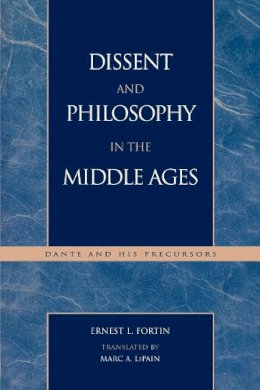

Stock image for illustration purposes only - book cover, edition or condition may vary.
Dissent and Philosophy in the Middle Ages: Dante and His Precursors: Dante and His Precursors (Applications of Political Theory)
Ernest L. Fortin
€ 5.91
FREE Delivery in Ireland
Description for Dissent and Philosophy in the Middle Ages: Dante and His Precursors: Dante and His Precursors (Applications of Political Theory)
paperback. This work provides an integral understanding of the political, philosophical and religious context of Dante's "Divine Comedy". Initially written in French in 1981, it brings to light the complexity of Dante's thought and art, and its relation to the central themes of Western civilization. Translator(s): LePain, Marc A. Series: Applications of Political Theory. Num Pages: 192 pages, bibliography, index. BIC Classification: 2ADT; 3H; DSBB; DSC; HRAB. Category: (G) General (US: Trade). Dimension: 226 x 156 x 14. Weight in Grams: 299. Good clean copy with minor shelfwear, remains very good
Dissent and Philosophy in the Middle Ages offers scholars of Dante's Divine Comedy an integral understanding of the political, philosophical, and religious context of the medieval masterwork. First penned in French by Ernest L. Fortin, one of America's foremost thinkers in the fields of philosophy and theology, Dissidence et philosophie au moyen-%ge brings to light the complexity of Dante's thought and art, and its relation to the central themes of Western civilization. Available in English for the first time through this superb translation by Marc A. LePain, Dissent and Philosophy will make a supremely important contribution to the discussion of Dante as poet, theologian, and philosopher.
Product Details
Format
Paperback
Publication date
2002
Publisher
Lexington Books
Condition
Used, Very Good
Series
Applications of Political Theory
Number of Pages
192
Place of Publication
Lanham, MD, United States
ISBN
9780739103272
SKU
KSG0034166
Shipping Time
Usually ships in 2 to 4 working days
Ref
99-1
About Ernest L. Fortin
The lateErnest L. Fortin was Emeritus Professor of Theology at Boston College. He was the author of numerous books on ancient and medieval philosophy and religion. Marc A. LePain is Professor of Theology at Assumption College.
Reviews for Dissent and Philosophy in the Middle Ages: Dante and His Precursors: Dante and His Precursors (Applications of Political Theory)
This is intellectual history at its best. It ranges over Islamic and Jewish thought, as well as the Greco-Latin tradition, and places Dante in an illuminating way. Essential for Dante studies.
National Review
Ernest L. Fortin's subtle study of Dante's dissent will help clear away the Anglo-American fashion of reading Dante as versified Augustine or Aquinas. Dante's reticences and implied stances emerge vividly in Fortin's precise pages.
Harold Bloom, Yale University This English translation...comes as an urgent reminder of how important Dante is as a political thinker.
Diskin Clay, Duke University Fortin presents a Dante who believes in philosophy's autonomy from and even superiority to theology (and who conceals this knowledge). This startling, fresh, and controversial thesis opens up the way for a view of poetry that straddles the boundaries between concealment and clarity, fiction and truth.
Giuseppe Mazzotta, Yale University The first words of Fortin's book are these: "This modest work does not pretend to be exhaustive." When you read it you will see that there are other ways to be ambitious than by being exhaustive, namely: essential, magesterial, and path-breaking.
Claremont Review of Books
Ernest Fortin is the better sort of scholar: when he is unconventional and provocative (as he is when he treats Dante), he displays enviable learning, patent argumentation open for inspection, and an ingratiating pen. Marc LePain's translation of Fortin's elegant French is trustworthy and the additions he makes to Fortin's original French volume add significantly to Fortin's argument, and to our appreciation of his achievement in reopening for us the question of Dante.
Paul Seaton, associate professor of philosophy, St. Mary’s Seminary & University, Baltimore, MD.
National Review
Ernest L. Fortin's subtle study of Dante's dissent will help clear away the Anglo-American fashion of reading Dante as versified Augustine or Aquinas. Dante's reticences and implied stances emerge vividly in Fortin's precise pages.
Harold Bloom, Yale University This English translation...comes as an urgent reminder of how important Dante is as a political thinker.
Diskin Clay, Duke University Fortin presents a Dante who believes in philosophy's autonomy from and even superiority to theology (and who conceals this knowledge). This startling, fresh, and controversial thesis opens up the way for a view of poetry that straddles the boundaries between concealment and clarity, fiction and truth.
Giuseppe Mazzotta, Yale University The first words of Fortin's book are these: "This modest work does not pretend to be exhaustive." When you read it you will see that there are other ways to be ambitious than by being exhaustive, namely: essential, magesterial, and path-breaking.
Claremont Review of Books
Ernest Fortin is the better sort of scholar: when he is unconventional and provocative (as he is when he treats Dante), he displays enviable learning, patent argumentation open for inspection, and an ingratiating pen. Marc LePain's translation of Fortin's elegant French is trustworthy and the additions he makes to Fortin's original French volume add significantly to Fortin's argument, and to our appreciation of his achievement in reopening for us the question of Dante.
Paul Seaton, associate professor of philosophy, St. Mary’s Seminary & University, Baltimore, MD.
